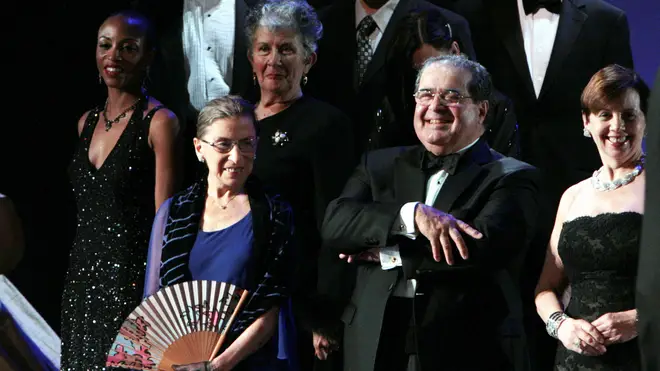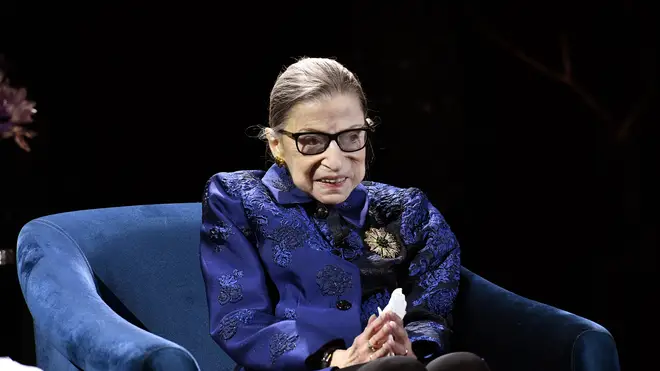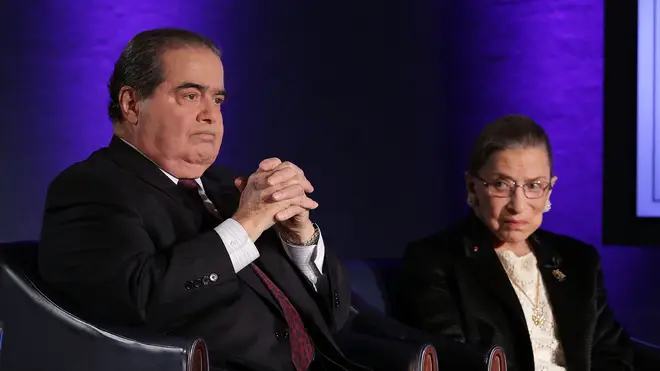On Air Now
Calm Classics with Ritula Shah 10pm - 1am
21 September 2020, 18:15 | Updated: 21 September 2020, 18:17

Nothing can bypass politics, partisanship and power dynamics quite like music...
Ruth Bader Ginsburg, who sadly died on Friday 18 September, was a beacon for justice, a feminist icon, and an all-round inspiration. And she was also an avid opera fan.
‘The Notorious RBG’ as she was known affectionately by friends and fans around the world, attended productions in Washington and at The Met on a regular basis, often watching the same production many more times than once, through its dress rehearsals, opening nights and closing nights.
She even made an operatic debut of sorts in Washington National Opera’s 2016 production of Donizetti’s La Fille du Régiment, as well as several cameos.
Her passion for the art form made her known to opera stars, and tributes have been pouring in from opera singers all over the world following her death – including from mezzo Joyce DiDonato, who re-shared RBG’s insights on blind auditions in an Instagram post.
Read more: Woodland creatures sing a Bellini opera in beautiful short film >
“In all my years growing up, I never saw a woman in a symphony orchestra,” Ginsburg says in an interview with DiDonato (above). She talks about how The New York Times critic Howard Taubman once swore he could tell the difference between a woman at the piano and a man – before he was blindfolded and bemused to the point of proving himself wrong. The blind audition was born.
RBG’s eloquent explanation of blindness to gender or sex of musicians being important is a powerful symbol for her approach to politics. Rather than being stuck on an idea or belief because of bias, she saw law as an objective system for solving problems with appropriate, rational and, crucially, non-biased approaches.
Heartbroken. Utterly and totally heartbroken.
— Jamie Barton (@jbartonmezzo) September 19, 2020
Rest in power, Justice Ginsburg. You were a real life superhero, and you made the world a better place for so many others, myself very much included. Thank you. pic.twitter.com/p7WXg8EARX
Ginsburg’s love of opera was ignited when she saw Ponchielli’s La Gioconda in Brooklyn at the age of 11. From then on, she visited regularly, and would succumb to an entirely absorbed, totally transformed state when listening to the music and watching the action unfold on stage.
In 2015, she said: “Most of the time, even when I go to sleep, I’m thinking about legal problems. But when I go to the opera, I’m just lost in it. Loving it. And I don't think about any legal brief.”
RBG’s love of the art form also helped fuel one of the most unlikely friendships in politics – a friendship that, in turn, inspired its own opera.
Read more: Who is Golda Schultz? Meet the journalism major who became opera’s biggest new star >

Justice Ginsburg Explains the 'Scalia/Ginsburg' Opera
Ginsburg was famously friends with the late Justice Antonin Scalia. The two were at the opposite ends of the political spectrum but their love of opera saw them regularly dine and attend performances together. They were firm friends in spite of, and in some ways because of, their different political beliefs and approaches.
Their shared love of music was first encapsulated in opera when they made cameo appearances in Washington National Opera’s 1994 production of Ariadne auf Naxos.
It was further immortalised by Scalia/Ginsburg, a comic opera by Derrick Wang “inspired by the opinions of U.S. Supreme Court Justices Ruth Bader Ginsburg and Antonin Scalia” following the “operatic precedent” – i.e. in the style of – Handel, Mozart, Rossini, Bellini, Verdi and many more composers.
The comic opera tackles friendship in a divided world, exploring the relationship between right-wing, ‘bombastic’ Scalia and left-wing, understated Ginsburg. The opera premiered in 2015 at the Castleton Festival, and starred soprano Ellen Wieser as Justice Ginsburg and John Overholt as Justice Scalia, with a third character, bass-baritone Adam Cioffari, as a neutral commentator.
The libretto is based on Ginsburg and Scalia’s duelling opinions from court, and lines from, speeches and articles they wrote over their careers.

“It opens with Scalia’s ‘Rage Aria’,” Ginsburg explained on The David Rubenstein Show (watch above). “It’s an aria that’s very Handellian in style. He sings ‘The justices are blind, how can they possibly spout this? The constitution says absolutely nothing about this.’
“And then in my coloratura soprano, I answer, ‘Dear Justice Scalia, you are searching for bright-line solutions to problems that don’t have easy answers, but the great thing about our constitution is that, like our society, it can evolve.’”
The plot is roughly based on Mozart’s The Magic Flute, according to Ginsburg, and Scalia is locked up in a dark room as punishment for excessive dissenting. “I then emerge through a glass ceiling…” RGB continues, to laughter and rapturous applause from the TV show’s audience.
The opera is as educational as it is entertaining, according to the Los Angeles Times: “Could we please make it a constitutional requirement that no one can be sworn into office in the White House or Congress without having first seen Scalia/Ginsburg?”

RBG - Official Trailer
“The opera is really touching because it shows two people who interpret the Constitution differently but genuinely like each other,” Ginsburg herself said. “The last duet we sing is ‘We Are Different, We Are One’,” Ruth Bader Ginsburg explained. “Different in the way we interpret written texts, one in our reverence for the institution we serve, the Supreme Court of the United States.”
Writing for The Washington Post, Antonin Scalia’s son Eugene Scalia explained how his father and RBG could be such close friends: “It was quite simple, as some of the best friendships are. They worked at the same place. They were both New Yorkers, close in age and liked a lot of the same things: the law, teaching, travel, music and a meal with family and friends.
“They had a bond, I think, in that they both grew up as outsiders — to different degrees — to the elites who had ruled the country: she as a Jew and woman, he as a Catholic and Italian American.”

Scalia Jr also explains that their “appreciation” for each others’ differences was “as integral to the justices’ friendship as the similarities.”
“What we can learn from the justices, beyond how to be a friend,” Scalia writes, “is how to welcome debate and differences.”
It is such an important message – full of love and respect in a time characterised by partisanship and polarity – that you can have different beliefs, but a common goal. Most importantly, that having different beliefs shouldn’t mean you can’t be true friends.
And, crucially, that a common love can unite.
Music is powerful in many ways – and bringing people together is of course its greatest power of all.